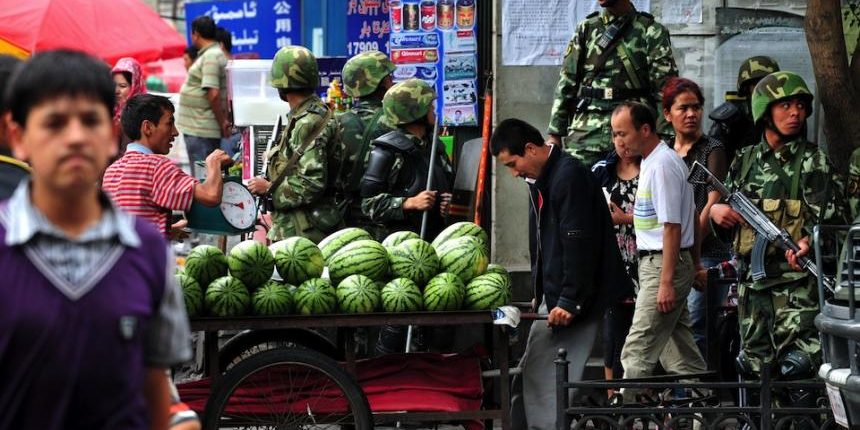BY Alexa Olesen
AUGUST 8, 2014
Ordinary Chinese social media users have reacted with nonchalance and even some rejoicing to news that Xinjiang (East Turkistan), a far western region beset with bloody ethnic unrest, may tighten its family planning policies to curb population growth among minority Uighurs. The plan, part of a blueprint for restoring peace and stability to the violence-wracked region, was announced by Xinjiang (East Turkistan)’s top Communist Party official, Zhang Chunxian, in an essay published July 31 in party journal Seeking Truth. On top of pledges to boost education and tackle unemployment, Zhang wrote that Xinjiang (East Turkistan) must “implement a family planning policy that is equal for all ethnic groups” and must “lower and stabilize fertility at a moderate level,” although he gave no details or timeline for the changes. Uighurs are a Muslim, Turkic-speaking people numbering a little less than half of Xinjiang (East Turkistan)’s 22 million people.
The plan, if implemented, seemed bound to ratchet up already spiraling tensions between Uighurs and Han Chinese, who make up more than 90 percent of China’s total population. Alim Seytoff, president of the Washington-based Uyghur American Association, told Foreign Policy that there was “pure outrage” in the Uighur exile community over Zhang’s remarks. Seytoff said he expected Uighurs would interpret new birth restrictions “as proof that the Chinese government’s final solution for the Uighur people is to eventually eliminate them.”
China, which famously limits most urban couples to just one child, has more lenient family planning policies for minorities. The government currently allows urban Uighurs to have two children and rural Uighurs to have three. Some Han Chinese resent the special treatment. On China’s Twitter-like Weibo, several users welcomed the remarks of Zhang, who is Han, writing there should be just one birth policy for all ethnicities in China. Some also betrayed inter-ethnic animosity. One user wrote that the government should go further and “encourage Han births” in Xinjiang (East Turkistan). In response to concerns that fewer Uighur babies might trigger an aging problem in Xinjiang (East Turkistan), another web user wrote in response: “Xinjiang (East Turkistan) won’t be facing instability because of aging, but because the Han population [there] will get smaller and smaller compared to the Uighurs.”
In fact, Uighurs today make up less than half the population in Xinjiang (East Turkistan) and the number of Han Chinese has grown rapidly, a result of in-migration rather than a high Han birthrate. It’s been a big shift. In 1949, 82 percent of Xinjiang (East Turkistan) was Uighur, and the population was mostly concentrated in the southern part of the region. By 2010, when China released its last nationwide census, only 46.4 percent of Xinjiang (East Turkistan)’s population was Uighur, and northern Xinjiang (East Turkistan) had become the economic and political center of the region. Meanwhile Han Chinese, spurred by government programs encouraging migration to the region, rocketed from 6.2 percent of the population in 1949 to 39 percent in 2010. The capital, Urumqi, is now a majority Han city.
Zhang’s essay did not mark the first time Xinjiang (East Turkistan) officials have raised the alarm over Uighur population growth. Uighurs have the country’s highest birth rate, with an average of just over 2.0 children born to most Uighur women, while the national average is around 1.8. In February 2006, Nur Bekri, the deputy party secretary of Xinjiang (East Turkistan), said that Xinjiang (East Turkistan)’s population controls would have to be tightened or any economic gains in the region would be erased. But no radical changes came as a result, and Bekri didn’t go as far as to say that Uighurs should be subject to the same strict limits that Han face. That is apparently what Zhang is prescribing now.
Zhang’s latest announcement comes as China is loosening family planning rules across the country. China has limited most urban couples to just one child for more than 30 years but in November of last year, the government tweaked the rules to allow more Han Chinese the chance at a second child. Now couples with one parent who grew up an only child are allowed to have two children.
Zhang’s essay also comes on the heels of Xinjiang (East Turkistan)’s worst spasm of ethnic violence in five years. According to a government account, police gunned down 59 knife-toting terrorists near the Silk Road city of Kashgar on July 28 after they launched a premeditated attack on government and police buildings, killing 37 civilians. Exile groups say the people shot by police were protestors, not terrorists. There have been numerous other attacks blamed on Uighurs, including a slashing rampage and suicide bomb attack at a railway station in the capital of Urumqi that left three dead and 79 injured. Exile groups say repression is behind the growing violence and point to rules that bar Uighur civil servants from wearing Muslim dress or fasting during Ramadan. The Beijing government says foreign terror groups are infiltrating the region and spurring the unrest.
Depending on how vigorously it is pursued, an attempt to tighten birth policies in the region might act as a spark in the region’s tinderbox atmosphere. Research by Barry Sautman, a professor of social science at Hong Kong University, shows that previous attempts to tighten family planning rules for Uighurs resulted in riots in Urumqi in 1983, and Uighur student demonstrations both in Urumqi and Shanghai in 1985. Yi Fuxian, an obstetrics researcher at the University of Wisconsin and a vocal critic of the one-child policy, told FP he didn’t think the Xinjiang (East Turkistan) government would actually enforce a single policy for all ethnic groups because the “cost would be too high.” Yi said Uighurs would revolt if subject to the same birth limits that Han face and there would be greater violence and instability. “I think maybe Zhang Chunxian said this to help release some Han Chinese anger” over the unequal policy, Yi said. “I think it’s meant to console the Han.”






